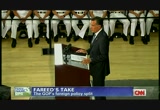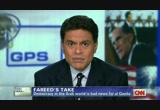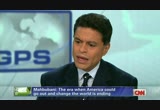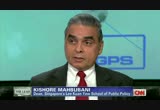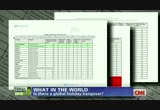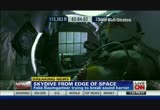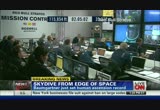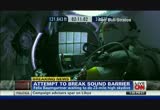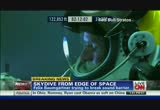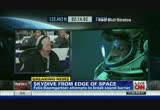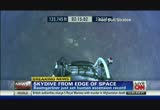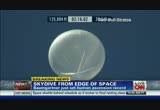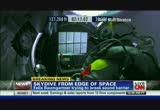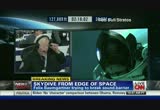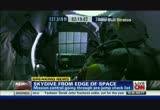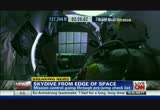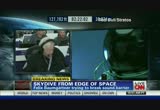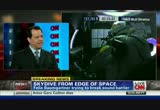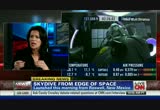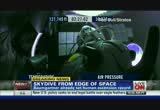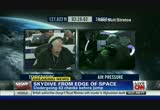tv Fareed Zakaria GPS CNN October 14, 2012 10:00am-11:00am PDT
10:00 am
to be fantastic. >> thanks to my colleagues for the tips. check out the debate live tuesday at 7:00 p.m. eastern. you can send me questions about the debate. go to cnn ireport.com/candy crowley. if you missed any of the show, go to itunes and search state of the union. fareed zakaria i can't is next for our viewers in the united states. this is gps, the global public square. welcome to all of you in the united states and around the world. i'm fareed zakaria. on monday mitt romney set out his foreign policy plank. in eight days romney and obama will debate foreign affairs. so we will ask a terrific panel what to make of romney's foreign policy. next up, "argo," the amazing little known story of six americans who actually escaped from the embassy in tehran in
10:01 am
1979 and eventually got out of the country. i'll talk to the man at the cia who masterminded the operation. ben affleck plays him on the big screen, but you get the real version with us. finally, drew faust, the president of harvard, on how the civil war changed america. also, do you feel guilty taking a day off from work? don't. it's probably good for your country. i'll explain. but first here's my take. recently intelligence squared a feisty forum in new york debated the proposition better elected islamists than dictators, referring to the choices confronting america in the middle east. the lead speaker for the proposition was a prominent conservative intellectual, reuel marc gerecht. and the lead speaker against the proposition was a prominent conservative intellectual, daniel pipes. that's a reflection of the state of conservative thought on the most dramatic events sweeping the world.
10:02 am
mitt romney's foreign policy speech sounded alarms about the turmoil in the region, but he, too, seemed somewhat unsure which side he would be on. on the one hand you have commentators like the romney adviser john bolton and the tv anchor sean hannity who believe that the obama administration should have tried to kp hosni mubarak in power in egypt. hannity described the emerging democratic system in egypt as the rise of violence, hate, islamic extremism, madness, and death. on the other hand, you have conservative policy makers like paul wolfowitz and others who have celebrated the fall of arab tyrannies, some of whom only wish that president obama had been quicker to support the transition to elections. this debate is important. over the next few decades the middle east could see the rise of illiberal democracies, countries with elections but few individual rights, or it could see a gradual evolution toward pluralism and the rule of law. but this discussion is being superseded by a visceral reaction to islam and islamism
10:03 am
as hannity's comments suggest that is neither accurate nor helpful in understanding what is happening on the ground. the heart of the problem in the arab world was that the old order was highly unstable. repressive regimes like the one in egypt had created over the decades extreme opposition movements. that opposition often became violent, and it attacked america for supporting these dictatorships. in other words, america's support for mubarak or the saudi monarchy and other saudi regimes fueled the anti-american terrorist groups that then attacked us on 9/11. al qaeda understands that if the arab world democratizes, it loses the core of its ideological appeal, which is why al qaeda's head ayman al zawahiri wrote a book condemning the egyptian muslim brotherhood's decision to support and participate in egypt's democratic process. so while we might despair over a
10:04 am
particular state liberal policy from the new arab regimes, they have produced elected leaders with real legitimacy, and these leaders do denounce al qaeda and violence, and they do try in their own way to reconcile islam and democracy. should we encourage that, or should we oppose them? that's why romney in the end proposes that we work with the elected governments of libya and egypt and try to push them in the right direction. now, there is one place where a resolutely secular dictatorship, one that has battled political islam for decades, is in trouble, and it's in trouble from an opposition management -- movement that has within it radical islamic forces. so those who truly believe it is better to back secular dictators than gamble on the prospects of political islam should be supporting the regime of bashar al assad in syria. for more on this, read my column in "the washington post." there's a link on
10:05 am
cnn.com/fareed. cnn.com/fareed. and let's get started. -- captions by vitac -- www.vitac.com we will leave it to others to analyze the ups and downs of the vice-presidential debate. we will get to the main course. what to make of mitt romney's foreign policy speech this week, what to make of the state of the arab spring, and the candidates' responses to it. joining me now are bill keller, the former executive editor of "new york times" now an op-ed columnist for that paper, danielle pletka, the vice president for foreign and defense policy studies at aei, bret stephens, "the wall street journal's" foreign affairs columnist, and kishore mahbubani, the dean and professor in the practice of public policy of the lee kuan yew school of public policy at the national university of singapore. welcome back to all of you. bill, what did you make of what was billed as romney's major foreign policy address? >> well, the interesting thing to me was, you know, when you strip away the rhetoric and the
10:06 am
kind of high-minded talk about leadership, he's not that different from obama, and on a couple of points it seemed to me he moved a little closer to president obama, maybe analogous to the way he moved to the middle on domestic policy in the first debate. >> danielle, you wrote an op-ed in the "times" calling him to present the kind of stark substantive contrast or at least a vision. i wasn't so clear it was a contrast. what did you think of it? did he deliver for you? >> i thought he delivered to me up to a point. i think that he made a lot of effort to be more specific than he has. you know, the campaign on foreign policy has really been plagued by a certain vagueness in which obama has run on his record and romney has kind of run as not obama, but none of that has had any real texture to it. i think that he did a good job in adding to it in certain areas. i think as bill said, in some there was a surprising contrast
10:07 am
-- surprising lack of contrast with obama, particularly on iran. he merely said that he would be better on sanctions. and that's not -- that's not really much of a contrast, so, yes, good, good on certain issues, good on russia, good on the question of the arab spring, i thought, quite specific. but on this other question of iran, perhaps a little more vague than i would have liked. >> i think we're looking at this in the wrong way. this was not a policy speech. this was a political speech. it was a tonal speech. it was a way of saying i'm mitt romney, i have some thoughts about foreign policy, there somewhat tougher sounding than the incumbent is, but let's face it, you know, those -- it's yre somewhat tougher sounding than the incumbent is, but let's face it, you know, those -- it''re somewhat tougher sounding than the incumbent is, but let's face it, you know, those -- it's re somewhat tougher sounding than the incumbent is, but let's face it, you know, those -- it're somewhat tougher sounding than the incumbent is, but let's face it, you know, those -- it'yre somewhat tougher sounding than the incumbent is, but let's face it, you know, those -- it''re somewhat tougher sounding than the incumbent is, but let's face it, you know, those -- it's almost like a proverbial curse. you know, enunciate a foreign policy doctrine as a candidate for the presidency, and the gods will laugh at you. president obama was going to close guantanamo within a year
10:08 am
of his presidency. president bush came into office promising a humbler foreign policy. president clinton came into office saying i'm going to deal with the butcher of belgrade. he did, but not until after the massacre of srebrenica. so i think we need to look at foreign policy pronouncements from either candidate with a certain grain of sal this was tonal. this was saying do you prefer chocolate to vanilla and not look at it with fine grade analysis. >> kishore, what does it look like from halfway across the world? >> well, i agree with bret. this is for election purposes, for the domestic audience, but if you look at it from the outside, there's a sense of incredulity that americans believe you can be a white knight and you can go out and remake countries overseas and save them. you know, the disasters of afghanistan, iraq, and now libya. i think the era when america could go out and change the world, is ending. so from the point of view from the rest of the world, a much more realistic appreciation of the difficulties of changing the world would be better. >> danielle, you raised the arab spring. that was rhetorically the most stark contrast. even though wasn't clear in policy terms what he would do. the essential argument was, you know, you have these huge
10:09 am
changes taking place around in the arab world and obama is watching them passively rather than actively shaping them. do you think that -- you know, is that a -- is there something the united states could do that would more actively change what's going on in the middle east in a they would be beneficial to them or to us? >> it's not that we can make the egyptians different, make him successful or fail. be pro american or anti. it's that insofar as our interests are concerned, we can at least be mindful of the fact there's been a change there. we have a massive aide program in egypt. program in egypt. if it's an aide program that's going to continue willy nilly because of camp david, okay, let's admit that that's what it's all about if it's an furthering our own values and promoting what we believe is beneficial, health care. women's rights, economic reform. then we need to stop a second and say who are we giving money to? how are we spending it?
10:10 am
what are we doing? we should do that every time the government changes. that's one of the things romney talked about that actually made sense, not in a partisan way or a muslim brotherhood is coming way. in a serious american foreign policy way. i think we saw that with libya. we turned our back. you're done, not our fight, thank you very much, good-bye. >> we're going to have to take a break. when we come back, more of the romney foreign policy. we're going to ask why he stopped bashing china when we come back. [ male announcer ] citi turns 200 this year. in that time there've been some good days. and some difficult ones. but, through it all, we've persevered, supporting some of the biggest ideas in modern history. so why should our anniversary matter to you? because for 200 years,
10:11 am
we've been helping ideas move from ambition to achievement. and the next great idea could be yours. ♪ your doctor will say get smart about your weight. i tried weight loss plans... but their shakes aren't always made for people with diabetes. that's why there's glucerna hunger smart shakes. they have carb steady, with carbs that digest slowly to help minimize blood sugar spikes. and they have six grams of sugars. with fifteen grams of protein to help manage hunger... look who's getting smart about her weight. [ male announcer ] glucerna hunger smart. a smart way to help manage hunger and diabetes. [ male announcer ] glucerna hunger smart. ♪ ♪
10:12 am
10:13 am
10:14 am
and we're back. do you think it's fair to say as i do that the conservatives are split on, you know, kind of fundamentally how to deal with the arab spring? is it a good thing or -- >> i've been actually joking that i've become a paleo neocon and my skepticism is for purely democratic movements. there is -- i think the split is actually fairly cosmetic and i think there's a way to heal this rift if it needs healing, which is that the united states should be and should have been, by the way, long ago, much more actively supporting reform with our friends and supporting regime change with our enemies. that's why i think it is such a -- >> let me press you on that because to be fair there was an eight-year period called the bush administration where to be fair to bush he tried and that
10:15 am
was very tough go get mubarak to reform and the saudis. it sounds like a good idea. >> that was a two-year or three-year administration that began with the fall of saddam and ended when hamas won the parliament election in 2006 and then let's face it. late bush administration was kind of a classic real lisist kind of a classic real lisist administration dealing with mubarak. we had an ambassador there who would extoll mubarak at every turn. the obama administration pursued that as well. so that was actually a great missed opportunity for the united states to really start pushing the mubarak regime maybe once it succeeded but it was at least worth a try to say your options are good. you're nothing going to be able to perpetuate this and you need to move progressively toward reform. >> bill, how does this strike you? >> what should we do to encourage the guy the head of
10:16 am
egypt, morsi, to honor his better angels? you know, he's clearly fumbling for a way to do that, you know. he got criticized a lot for going to tehran, but he went to tehran and criticized the butchers in syria. he got criticized for not protecting our embassy better but he did protect our embassy in cairo. yes, he should be doing all those sorts of things we used to be called nation building, but we should also, you know, using the carrots and sticks to encourage that kind of behavior. >> let me pick up on one thing you said. you brought this up. what can the united states do. united states can impose a no-fly zone over syria or western syria, precisely the kind we imposed over bosnia in the 1990s. there was one line in mitt romney's speech that stayed with me. he quoted a syrian woman saying
10:17 am
we will not forget that you've forgotten about us. i think that's important. there are ways in which we can use american power very effectively and very forcefully. so i think there are things we can do to tilt the balance in favor of our interest. >> let's talk about this. let's stay on syria for a little bit because i mean i would love to see us do more to help us get rid of the assad regime. i guess -- i don't know, but i would i guess that if, you know, hillary clinton could figure out a way to get surface to air-missile into the hands of the rebels that they wouldn't have later be used to shoot down american passenger liners she would do that and the obama administration would do that. if they could find a way to impose a no-fly zone without massive casualties because syria's more complicated than a military target than libya was where all the anti-aircraft was around the coastline, not in huge population centers. you know.
10:18 am
i think it's easy to which for those things but harder do them i want to emphasize this is not the end of htory moment. this is the return of history moment. the islamic world has been passive for 200 years. it is waking up it. is remaking itself. it will make itself in its own image. at the end of the day, much as i wish like all of you that we could go in there like a white knight and save the situation, sometimes it cannot be done. >> hang on a second. you can't -- you know, there's all of these platitudinous announcements like i wish we could do more and we could do more and this is their fight, yes, the war on the european continent was their fight and we did something and they were remade in an image, and guess what, it looks a lot like the image of the victors. the truth is these things can be done. we are the united states of america. yes, it's true. it's not libya.
10:19 am
on the other hand it's not the soviet union either. we have precision guided munitions. we can enforce a no-fly zone. we can do it without substantial. we can do it. we don't have the will and the syrian woman romney quoted knows it. it doesn't matter how many times use pronounce we wish we could doing? >> there is a civil war. >> there is a war. 30,000 plus people who are dead. >> you have to -- >> you can't stand aside. >> let me ask one more question about china and american leadership in responding to a request from the vietnamese and to a certain extent other countries. do you think the united states is inevitably going to play some kind of a role in balancing? >> the simple answer, yes. the world's most important relationship is with the world's greatest power and the world's
10:20 am
greatest emerging power is the united states. the greatest emerging power is china. there will have to be a balancing force as a result of the political competition and certainly the way that pivot whatever you may call it is welcomed in many countries because they'd rather see a balance with u.s. and china than any two or three doing it on their own. the biggest story about the u.s./china relationship is how both sides are maneuvering each othe positioning each other to avoid any kind of condition and that is good. >> were you surprised romney dropped what had been a staple of his peaches, which was kind of a china-bashing paragraph? that was not in this foreign policy. >> i was relieved. i think the worth part of the romney campaign is the ceaseless and i think very feckless and ultimately dangerous china bashing. we want china as a rising economic power and as a responsible political player and i hope that this is an
10:21 am
indication that romney at some level beyond the purely political and beyond the politics in ohio understands this. >> on that note, bret stephens, danielle, victory, bill, pleasure to have you all on. up next, "what in the world." the case for a new public policy in america. i'll explain. y in america. i'll explain. y in america. i'll explain. y in america. i'll explain. y in america. i'll explain. y in america. i'll explain. hy in america. i'll explain. ngoy in america. i'll explain. ttly in america. i'll explain. iy in america. i'll explain. idy in america. i'll explain. holiday in america. i'll explain. unin america. i'll explain. tdd#: 1-800-345-2550 which now have the lowest tdd#: 1-800-345-2550 operating expenses tdd#: 1-800-345-2550 in their respective tdd#: 1-800-345-2550 lipper categories. tdd#: 1-800-345-2550 lower than spdr tdd#: 1-800-345-2550 tdd#: 1-800-345-2550 and even lower than vanguard. tdd#: 1-800-345-2550 tdd#: 1-800-345-2550 that means with schwab, tdd#: 1-800-345-2550 your portfolio has d#: 1-800-345-2550 a better chance to grow. tdd#: 1-800-345-2550 and you can trade all our etfs online, tdd#: 1-800-345-2550 commission-free, from your schwab account. tdd#: 1-800-345-2550 tdd#: 1-800-345-2550 so let's talk about saving money, tdd#: 1-800-345-2550 with schwab etfs.
10:22 am
tdd#: 1-800-345-2550 schwab etfs now have the lowest operating expenses tdd#: 1-800-345-2550 in their respective lipper categories. tdd#: 1-800-345-2550 call 1-800-4schwab tdd#: 1-800-345-2550 or visit schwab.com tdd#: 1-800-345-2550 to open an account today. tdd#: 1-800-345-2550 funding is easy tdd#: 1-800-345-2550 with schwab mobile deposit. tdd#: 1-800-345-2550 investors should consider tdd#: 1-800-345-2550 carefully information d#: 1-800-345-2550 contained in the prospectus, d#: 1-800-345-2550 cluding investment objectives, d#: 1-800-345-2550 risks, charges, and expenses. d#: 1-800-345-2550 you can obtain d#: 1-800-345-2550 a prospectus by visiting tdd#: 1-800-345-2550 w.schwab.com/schwabetfs. please read the prospectus tdd#: 1-800-345-2550 carefully before investing. tdd#: 1-800-345-2550 oh, hey alex. just picking up some, brochures, posters copies of my acceptance speech. great! it's always good to have a backup plan, in case i get hit by a meteor. wow, your hair looks great. didn't realize they did photoshop here. hey, good call on those mugs. can't let 'em see what you're drinking. you know, i'm glad we're both running a nice, clean race. no need to get nasty. here's your "honk if you had an affair with taylor" yard sign. looks good. [ male announcer ] fedex office. now save 50% on banners.
10:23 am
his morning starts with arthritis pain. and two pills. afternoon's overhaul starts with more pain. more pills. triple checking hydraulics. the evening brings more pain. so, back to more pills. almost done, when... hang on. stan's doctor recommended aleve. it can keep pain away all day with fewer pills than tylenol. this is rudy. who switched to aleve. and two pills for a day free of pain. ♪ [ female announcer ] and try aleve for relief from tough headaches.
10:25 am
now for our "what in the world" segment. the summer holiday season is winding down, but last monday americans got to enjoy one last hurrah, a federal holiday, columbus day. it got me thinking about the economy. can we afford all these days off and how does america compare with the rest of the country?
10:26 am
a consulting firm ranks countries by the number of holidays each requires by law. the data confirms a number of commonly held stereotypes and there are a few surprises. take a look. top of the list is united kingdom with 28 statutory holidays. nine of the top ten countries are, of course, in europe who live a dulce vida. scroll down further and the list continues to be dominated by european countries. 20 days off for the germans, irish and italians, then come a bunch of latin american countries and the asian ones, hong kong, and singapore and where is the u.s.? dead last. zero statutory holidays. that's because federal law does not mandate paid time for work. americans are allowed 15 working days off a year. pretty close to the bottom of the list. what's more, only about half of the americans take their full
10:27 am
quote a of taste off -- of days off. europeans ones again have no such qualms, but let's go back to columbus day. these are days when government offices and banks are closed and so businesses have an incentive to follow suit, but even on those, the u.s. lags behind. top of the list are india with 16 public holidays and colombia with 18. but argentina has climbed even higher after mersa survey was published. it now has 19 public holidays. they, too, had last monday off. they don't call it columbus day. it's called day of respect for cultural diversity. the financial times reports how these holidays have increased by seven full days since president cristina kirchner took office in 2007. a 60% jump. the logic here isn't to keep people happy.
10:28 am
it's pointed out domestic tours during the long weekends have increased by 40% this year. the government estimates more than 800,000 people traveled around the country last weekend, spending $130 million. so how's that for a paradox. holidays that boost growth. in fact, it's a trade-off. the boost to tourism versus a decline in other economic activity but countries also have to juggle political and cultural sensitivities. i work hard but i like holidays. i think you get a chance to rechge and americans should. -- shouldn't worry about taking some time off. look around the world. we are not slackers. more important, most of our growth is fueled not by long hours but by innovation, productivity, education, and immigration. one final thought, if i had my way i would add one holiday to the u.s. calendar, one which most countries have. presidential election day. if we did that we would find
10:29 am
many more americans will take part in what should be. an essential act of citizenship. we'll be right back. up next it sounded like something out of a movie. now it's a movie. the 1979 hostage crisis in iran. i speak to a cia insider about the new film "argo." to build sa? people like anna and david, who are always worried about... tonito. ♪ tonito. tonito. tonito. tonito. tonito. [ male announcer ] the chevy cruze, with a five-star overall vehicle score for safety. inspired by anna, david, and tonito. from what matters to you to what's important to us, chevy runs deep.
10:33 am
this is cnn breaking news. >> i am fredricka whitfield. felix baumgartner is getting ready to sky dive 23 miles above earth in attempt to become the first person to go faster than the speed of sound. already, he has just broken a record now ascending to the highest point of of any human, that any human has gone in a balloon. he is right now many, many miles above earth, roughly 105,000 feet above earth. baumgartner is roughly, maybe under 10,000 feet away from his goal when he would actually leave the capsule that he is in at the bottom of that balloon that's already taken a different kind of shape.
10:34 am
if you saw it earlier, it was a tear dropped shape. now it is more of a lima bean formation. this is live pictures with delay of roughly 20 seconds of baumgartner in that capsule. pretty extraordinary to see these kinds of images that far away. mission control is in roswell, new mexico. you will be hearing some audio momentarily from them. you can also see him kind of conversing likely with mission control right now. brian todd is watching closely as is chad myers in atlanta. brian joins us from washington. brian spent a good part of last week in roswell and got to know some of the players involved in this. chad with a very great understanding of the science behind all of this this morning, all systems are go. there were some moments because of wind they thought perhaps conditions were not perfect. in the end, looked like perfect conditions for the ascent.
10:35 am
chad, let's begin with you. mission control very excited that already one record has been set just by virtue of the fact he met that goal of altitude. >> right. that's above anybody else in a balloon. the two men in that balloon, two separate men didn't make it to earth safe, they died in 1961. so this is not without threat. this is a major issue for felix to get down from there, literally, go the speed of sound awhile in a free fall, and finally land with a parachute, pull that chute about 5,000 feet. amazing. >> it is amazing. roughly an hour, hour and a half ago or so when he began that kind of ascent, you saw mission control, people were very excited, his mom was there on the ground. she had tears in her eyes. tears for a number of reasons. he has been working on this for some five years, training for this moment, but it also comes with great risks. >> the risk is that as he gets to the speed of sound, the suit
10:36 am
that he is wearing that is keeping him literally inflated from not his blood boiling because of lack of air up there, no oxygen at all, no air pressu, if that suit fails, he's in big trouble. if anything else fails on the way down, he is in big trouble. he has done it from 18 miles high. this is five miles higher. he is planning on getting to the speed of sound in almost 20 seconds. then as he gets to more air, that air will slow him down into the atmosphere. people say how can he go that fast? sky divers can't go that fast. sky divers don't jump from space, they jump where there's air out of an airplane and air slows him down. there's no air there for right now for the first 30 seconds to slow him down. >> chad, hold on. brian, you hold on as well in washington. we're going to take a break and come back, talk more about felix baumgartner, what he is doing, how he is defying the odds in so many ways, shapes, forms. dozens of miles above earth. we will be right back. there are a lot of warning lights
10:37 am
and sounds vying for your attention. so we invented a warning you can feel. introducing the all-new cadillac xts. available with a patented safety alert seat. when there's danger you might not see, you're warned by a pulse in the seat. it's technology you won't find in a mercedes e-class. the all-new cadillac xts has arrived, and it's bringing the future forward.
10:39 am
this is cnn breaking news. >> welcome back to this breaking story, fredricka whitfield in atlanta. sky diver felix baumgartner already setting a record going the highest any human has ever gone in a manned balloon, a helium balloon. he is now at near 120,000 feet above earth at nearly 23 miles above earth, and his plan is you're looking at live pictures now with delay of about 20 seconds in a capsule at the bottom of that helium balloon.
10:40 am
you're looking at a perspective of earth and him in that capsule as he talks to mission control in roswell, new mexico. with me, chad myers, has a great view of this and science backing it all as to what the goal is for baumgartner, and then in the washington bureau is brian todd who spent a good deal of time in roswell last week, has gotten to know the crew and all of the efforts behind this. chad, let me get back to you quickly. we were listening to mission control. it is a familiar voice. robert hager who many remember from nbc news covering space and flight hearing him explain we are close to that point, 120,000 feet where some assessments would be made in the capsule before felix baumgartner would jump out of that capsule, sky dive to earth. >> they're waiting for the balloon now to settle is what it's called, not go up any more.
10:41 am
it's still rising about 200, 300 feet a minute. still watching that. it might get to about 125 before the equalibrium takes place. the helium trying to rise, the capsule pulling it down. that's where all of the assessments go on, all of the preconditions go on, then he will step on the ledge of that capsule if it all goes right and he will dive to earth. >> brian, let me bring you into this. you spent a lot of time with the crew, with baumgartner when you were there in roswell, new mexico. what is he after, why is he doing this? >> well, he is after the record for free fall, after the record for breaking of sound barrier, fredricka, but also after some advancements in science and aerospace. they want to test to see if the suit he is wearing may be the next generation of high pressure suit. specifically they want to see if they can find out from this jump if a human being can survive outside a space vehicle for any length of time if there's a
10:42 am
malfunction in the space vehicle in future missions. that is really the principal goal of the mission. they also want to measure what happens to the human body when it goes through the sound barrier. they don't know it yet. this mission may tell them. they don't expect him to be battered so much. they think lack of air and pressure won't take such a huge toll on the body. no one has ever gone speed of sound outside protection of a vehicle. that's another thing they're trying to measure. one thing we have to tell you, fredricka, on the way up in the last few minutes, they have been reporting from the live feed that there was at least a slight issue in the heating of his visor in the helmet. he had been reporting, felix baumgartner reported it wasn't heating as it should have been. whether that's an issue in the actual jump we don't know, that has been an issue in the last few minutes. >> brian, thanks so much. in a moment, we resume the conversation about felix baumgartner and what he is after. first i want to pass on this
10:43 am
other bit of breaking news, a sizable piece of breaking news. a political world mourning the death of senator arlin spector. his family says the veteran pennsylvania lawmaker passed away at his home iphiladelphia this morning from complications of non-hodgkin's lymphoma. a service is planned tuesday in pennsylvania. earlier i spent with candy crowley who spent a lot of time on capitol hill, got to know him well, his politics, and he, the man, she will bring her perspective. we will be back after this. we are going to resume the conversation about felix baumgartner and all that's taking place roughly 23 miles above the earth's surface. you're looking at pictures on delay by about 20 seconds. you're looking at that helium
10:44 am
balloon which has taken an interesting shape now because of the change of the atmosphere, that helium in that thin skinned membrane. we understand that membrane is ten times thinner than a sandwich bag. incredibly fragile. but it, too, has great significance in the world of science and aeronautical engineering. a number of nasa workers also working on this project. we have mission control on the left side out of roswell, new mexico. they're thrilled about the one record that's already been broken by felix baumgartner. he has gone the highest any human has gone in a manned helium balloon. and you're looking of course on the right side of extraordinary live pictures by delay of about 20 seconds of baumgartner in that capsule. brian todd with me out of washington, chad myers here in atlanta. so brian, let's resume the
10:45 am
conversation. this crew is ecstatic about that one break through that's taken place and we'll try to hear what mission control is saying, too, when we hear a stream of conversation there, but brian, give me an idea how significant that initial milestone is for this project? >> well, you know, i need to know specifically fredricka which milestone you're talking about. >> talking about him going the highest any human has gone in a manned balloon. >> that was significant. chad talked about that record at about 106,000 feet or so, possibly higher than that. they're very excited about that. the balloon has kept its integrity. we can listen to mission control now. let's take you there.
10:46 am
>> just the moment we thought they would continue that conversation, they pause. we will listen for them. >> we can start integrity, egress check. need to know when to start the egress check. >> i'll let you know. felix is back, check his par chute handles. close off the oxygen from the capsule, try out the oxygen from bailout bottles very quickly. activate the cameras on his pressure suit. slide back and forth in the seat he's in there, built like the slides on a car seat. >> balloon still going up, 127,000 feet now. so that is higher than 24 miles
10:47 am
up. depressurize the capsule in two steps. they will depressurize it part way, at which point baumgartner's pressure suit should automatically begin to inflate. so they do it halfway to make sure it's going to inflate. then they dump the rest of the pressure to equalize pressure in the capsule to what it is outside because now he'll be protected by his pressure suit. then felix will open the door, he'll slide the seat back and forth. >> let me know when can start the egress check. >> kit in ger will do that exercise where he looks on the camera to see the parachute is okay.
10:48 am
>> okay, confirm ready to start egress check. >> something about the heat and the visor. he is getting the heat. >> ready. >> here we go, felix. item one. depressurize the suit, reinstall hose and cover. i need you to respond, felix, to my commands. item one, depressurize suit, reinstall hose and cover. felix, confirm depressurize suit, reinstall hose and cover, over. >> suit is depressurized, hose
10:49 am
and cover. >> item two, check bailout pressure. >> the bottom looking good. >> thank you. check location and security of all four parachute handles. >> all right, you're listening to mission control, they're doing a check for baumgartner right now, making sure everything is a go while he's in the capsule before he actually makes his jump from the capsule. everything from that four
10:50 am
parachute handle check there, you heard them talk about activating cameras as well, and that the pressure suit should inflate. chad myers with me along with brian todd in washington. brian spending a good amount of time in roswell, new mexico last week, which was the first scheduled jump but it was scrubbed jump, but it was scrubbed just because most of the conditions were not optimal, correct. >> that's right, fredricka, the conditions on the ground really crept up on them unexpectedly. they were going to launch this on tuesday, the 9th the october, and it got scrubbed at vthe ver last minute. they were literally a few minutes from launching the balloon. it's because wind came up on the surface and whipped that balloon up in a spinning motion. it really compromised the balloon. they had to scrap it at that point and they told us afterwards it would be a couple days, at least, when they were measuring the weather, the wind, stuff like that, before they
10:51 am
could launch the mission. they had to bring in a backup balloon, and they were successful today in watching that backup balloon. they said it might be, quote, some weeks if they had not launched it today until they could launch it again. >> now, there are a few things mission control wants to be cognitive of during this check right now. a, they want to make sure the equipment is working, but at the same time they want to see and hear from felix baumgartner, that he has the wherewithall to be following their instructions. what are you hearing that's important here in their dialo e dialogue? >> it was interesting, joe kiddinger, who has been in his ear since they took off this morning, said we're going to go through what's called the egress checks right now. that's a check of his capsule and his suit before he walks off. he has 42 checks to make when he gets to floating altitude before he can actually make that jump.
10:52 am
they're going through egress checks right now, and before they started them, interestingly, felix baumgartner didn't respond in the few few seconds to joe kiddinger's saying, let's go through step one. he said, felix, i need you to respond to me, and then we heard felix respond to him. i thought for a second there was a radio problem. that wasn't the case. maybe felix was just doing something that preoccupied him. but as you can see, every little thing that's going on right now is being measured and monitored by all of us. >> all right, brian, thanks so much. you're going to leave the set for a moment to do some reporting. chad, i'm going to bring you in. your instincts said the same thing, when you heard about that delay like brian just kind of outlined there. felix didn't respond at first to mission control. this kind of set off a couple alarm bells for you as well. why? >> sure did. i was wondering if 20-second delay was enough at that point. he has been up there, and even though the capsule is pressurized and he's been
10:53 am
breathing oxygen, it's only pressurized to 20,000 feet. he's three-quarters up the top of mt. everest the last couple hours breathing this pure oxygen. they have to get all the nitrogen out of his system, the same way you want to get nitrogen out of your system when you're a scuba diver. that balloon that you're seeing, you're saying how it's changed shape. that balloon now has the volume of six madson square gardens combined in helium, and it is now at 127,800 feet, getting to equ equalibrium, check the pressure, make sure your mask is down, make sure your traps are tight on your helmet. these are all the steps they have to go through before he opens that door, steps out on the ledge and jumps out. >> it sounds like it's
10:54 am
painstaking. it has to be. 43 checks alone just on his flight suit. >> we're calling this mission control and that's what it is. but this is a private enterprise, mission control. he's not talking to houston. he's not talking to cape canavaral. >> although a lot of folks on the ground are familiar with those territories. >> and have worked there in the past, yes. he's not just jumping out on his own. this is an enterprise here not backed by the u.s. government. i've talked to other members and they're going, wow. this is something we might not do so quickly. felix has jumped so many times. this guy jumped off the arm of the concrete price in rio de janeiro as a base jumper. he's 33 years old but he's not somebody that is just a thrill seeker or they wouldn't let him do this. >> what is he, then? that is what one thinks, he's a daredevil, a thrill seeker, that he is someone who was setting out to get a lot of attention, doing extraordinary things most of us would not.
10:55 am
>> first of all, he's a helicopter pilot, and not being a pilot and not having that training, all of a sudden this wouldn't have happened. people with the know-how, the people with the know-how wouldn't have helped him. no, we're not going to help you die. absolutely not. you're not trained for this. but he did train. he trained for five solid years to do this, getting higher and higher and higher in his jumps. the last jump he did in july was from 18 miles. so now at 127.6 or 127.7, we're well above 124. they knew he would equalize between 120, and that's where we are right now. >> so he is a big believer in this mission, and thousands of people, many of whom have spent their careers in air nautical engineering, space flight, science, nasa, they are big believers here, too. what is the mission? what are they hoping to gain?
10:56 am
what knowledge, what technology, what look into the future are they hoping to gain from this mission alone? >> let me tell you, we are going to have space tours in the not so distant future. that sounded ridiculous ten years ago that someone would put you in a rocket, take you to space 60 miles high and then float back down. they are hoping that this suit that has been developed could save those people in case of a catastrophic event. if they had to bail out of that aircraft at 18, 20, 200, whatever number of miles they get to, could this suit save their life? and what happens to him when he does reach the speed of sound? there won't be much air where he reaches the speed of sound. it's different than an aircraft, different than a fighter pilot getting to the speed of sound. but he is going to get there. will there be some effect on the body, on the shaking, whatever it might be on his way down. >> chad, kind of take me through
10:57 am
the real tick-tock of the timeline of this. they were on the ground for a period of days preparing for this moment. the conditions were right even though they were talking about 100-plus miles per hour at 30,000 feet. that actually was optimal for them because of the thinness of that air and how that helium balloon would be able to handle the environment. once they made the decision that all things are a go, everything is good, give me an idea of what happened from there. it wasn't an immediate ascension, it takes maybe an hour, hour and a half, and then what are they looking for and what has been the process? >> the hardest part of the process is actually on the ground. getting the winds to die off between zero, which is the surface, and 700 feet above the surface. that's how tall that balloon is. they can't have and couldn't have that balloon blowing down wind at 30 miles per hour and all of a sudden felix is taking down and dragging down the
10:58 am
tarmac rather than going straight up. that was the first thing they had to do. that's what they didn't get to until about 10:30 or so on the pre-plan, on tuesday. that was the issue there. the balloon hit the ground. this balloon, we're talking about this balloon that they ruined to tuesday was over a quarter of a million dollars and it's trashed, it's done. this balloon is the thickness of a baggie that you get from the cleaners, yet it still weighs 3700 pounds. think how many baggies it would take from the cleaners to get to 4,000 pounds of baggies. i hate talking over this. people at home going, would you please just be quiet? let's see where they are here. >> all right. for those of you who are just joining us, you're looking at a live picture, even though there's about a 20-second delay. it's remarkable to be able to
10:59 am
see these kind of images 23 miles up into the air. this is felix baumgartner. he is a sky diver. you heard chad describe he's done an awful lot of things, but he's more than a daredevil. he really is a risk taker for the sake of science. >> destratezing the catastrophic air pressure. >> bob kiddinger at nasa talking to him, talking to us. >> that's why he's depressurizing, so he can unscrew the handle and open the door. >> they've done a number of checks that they've had felix baumgartner go through. they've practiced this a million times on the ground. now it's the real thing, having him check his
255 Views
IN COLLECTIONS
CNN (San Francisco) Television Archive
Television Archive  Television Archive News Search Service
Television Archive News Search Service  The Chin Grimes TV News Archive
The Chin Grimes TV News Archive 
Uploaded by TV Archive on

 Live Music Archive
Live Music Archive Librivox Free Audio
Librivox Free Audio Metropolitan Museum
Metropolitan Museum Cleveland Museum of Art
Cleveland Museum of Art Internet Arcade
Internet Arcade Console Living Room
Console Living Room Books to Borrow
Books to Borrow Open Library
Open Library TV News
TV News Understanding 9/11
Understanding 9/11

